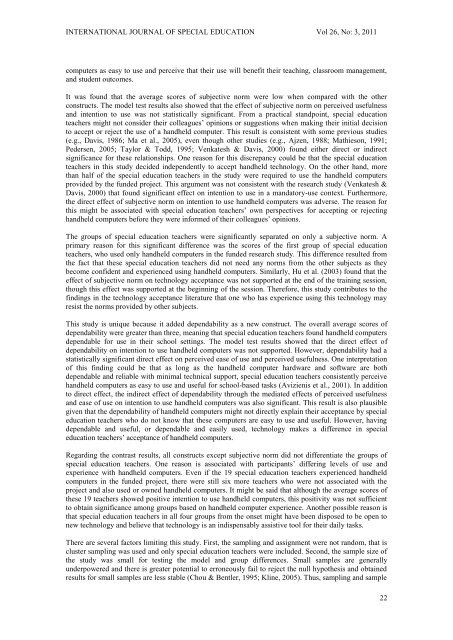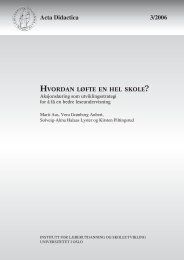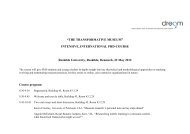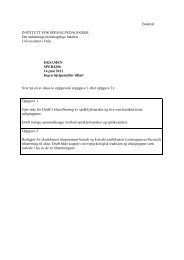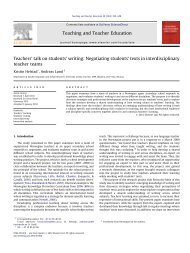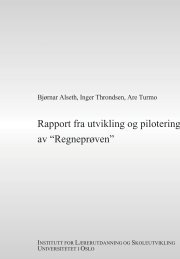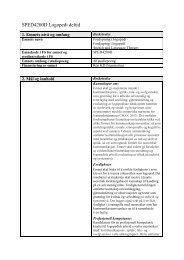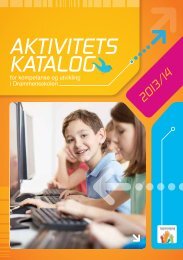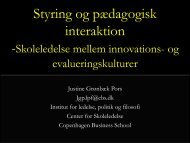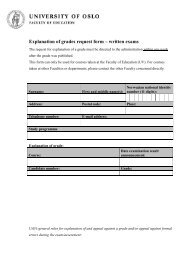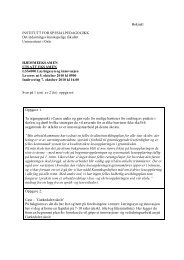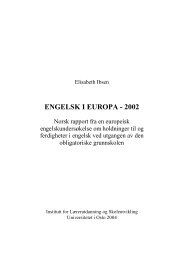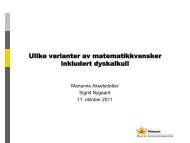International Journal Special Education
International Journal Special Education
International Journal Special Education
You also want an ePaper? Increase the reach of your titles
YUMPU automatically turns print PDFs into web optimized ePapers that Google loves.
INTERNATIONAL JOURNAL OF SPECIAL EDUCATION Vol 26, No: 3, 2011computers as easy to use and perceive that their use will benefit their teaching, classroom management,and student outcomes.It was found that the average scores of subjective norm were low when compared with the otherconstructs. The model test results also showed that the effect of subjective norm on perceived usefulnessand intention to use was not statistically significant. From a practical standpoint, special educationteachers might not consider their colleagues’ opinions or suggestions when making their initial decisionto accept or reject the use of a handheld computer. This result is consistent with some previous studies(e.g., Davis, 1986; Ma et al., 2005), even though other studies (e.g., Ajzen, 1988; Mathieson, 1991;Pedersen, 2005; Taylor & Todd, 1995; Venkatesh & Davis, 2000) found either direct or indirectsignificance for these relationships. One reason for this discrepancy could be that the special educationteachers in this study decided independently to accept handheld technology. On the other hand, morethan half of the special education teachers in the study were required to use the handheld computersprovided by the funded project. This argument was not consistent with the research study (Venkatesh &Davis, 2000) that found significant effect on intention to use in a mandatory-use context. Furthermore,the direct effect of subjective norm on intention to use handheld computers was adverse. The reason forthis might be associated with special education teachers’ own perspectives for accepting or rejectinghandheld computers before they were informed of their colleagues’ opinions.The groups of special education teachers were significantly separated on only a subjective norm. Aprimary reason for this significant difference was the scores of the first group of special educationteachers, who used only handheld computers in the funded research study. This difference resulted fromthe fact that these special education teachers did not need any norms from the other subjects as theybecome confident and experienced using handheld computers. Similarly, Hu et al. (2003) found that theeffect of subjective norm on technology acceptance was not supported at the end of the training session,though this effect was supported at the beginning of the session. Therefore, this study contributes to thefindings in the technology acceptance literature that one who has experience using this technology mayresist the norms provided by other subjects.This study is unique because it added dependability as a new construct. The overall average scores ofdependability were greater than three, meaning that special education teachers found handheld computersdependable for use in their school settings. The model test results showed that the direct effect ofdependability on intention to use handheld computers was not supported. However, dependability had astatistically significant direct effect on perceived ease of use and perceived usefulness. One interpretationof this finding could be that as long as the handheld computer hardware and software are bothdependable and reliable with minimal technical support, special education teachers consistently perceivehandheld computers as easy to use and useful for school-based tasks (Avizienis et al., 2001). In additionto direct effect, the indirect effect of dependability through the mediated effects of perceived usefulnessand ease of use on intention to use handheld computers was also significant. This result is also plausiblegiven that the dependability of handheld computers might not directly explain their acceptance by specialeducation teachers who do not know that these computers are easy to use and useful. However, havingdependable and useful, or dependable and easily used, technology makes a difference in specialeducation teachers’ acceptance of handheld computers.Regarding the contrast results, all constructs except subjective norm did not differentiate the groups ofspecial education teachers. One reason is associated with participants’ differing levels of use andexperience with handheld computers. Even if the 19 special education teachers experienced handheldcomputers in the funded project, there were still six more teachers who were not associated with theproject and also used or owned handheld computers. It might be said that although the average scores ofthese 19 teachers showed positive intention to use handheld computers, this positivity was not sufficientto obtain significance among groups based on handheld computer experience. Another possible reason isthat special education teachers in all four groups from the onset might have been disposed to be open tonew technology and believe that technology is an indispensably assistive tool for their daily tasks.There are several factors limiting this study. First, the sampling and assignment were not random, that iscluster sampling was used and only special education teachers were included. Second, the sample size ofthe study was small for testing the model and group differences. Small samples are generallyunderpowered and there is greater potential to erroneously fail to reject the null hypothesis and obtainedresults for small samples are less stable (Chou & Bentler, 1995; Kline, 2005). Thus, sampling and sample22


